 Tìm kiếm
Tìm kiếm
Chương I Nghị định 23/2015/NĐ-CP: Những quy định chung
| Số hiệu: | 23/2015/NĐ-CP | Loại văn bản: | Nghị định |
| Nơi ban hành: | Chính phủ | Người ký: | Nguyễn Tấn Dũng |
| Ngày ban hành: | 16/02/2015 | Ngày hiệu lực: | 10/04/2015 |
| Ngày công báo: | 16/03/2015 | Số công báo: | Từ số 357 đến số 358 |
| Lĩnh vực: | Dịch vụ pháp lý | Tình trạng: | Còn hiệu lực |
TÓM TẮT VĂN BẢN
Chính phủ vừa ban hành Nghị định 23/2015/NĐ-CP quy định về cấp bản sao từ sổ gốc, chứng thực bản sao từ bản chính, chứng thực chữ ký và chứng thực hợp đồng, giao dịch.
Theo đó, Quy định cụ thể về thẩm quyền và trách nhiệm chứng thực của Ủy ban nhân dân cấp xã, đơn cử như:
- Thẩm quyền chứng thực hợp đồng, giao dịch liên quan đến tài sản là động sản.
- Thẩm quyền chứng thực hợp đồng, giao dịch liên quan đến thực hiện các quyền của người sử dụng đất theo quy định của Luật đất đai.
- Thẩm quyền chứng thực hợp đồng, giao dịch về nhà ở theo quy định của Luật Nhà ở.
Nghị định này có hiệu lực từ ngày 10/4/2015 và thay thế Nghị định 79/2007/NĐ-CP , 04/2012/NĐ-CP .
Văn bản tiếng việt
Văn bản tiếng anh
Nghị định này quy định về thẩm quyền, thủ tục cấp bản sao từ sổ gốc; chứng thực bản sao từ bản chính; chứng thực chữ ký; chứng thực hợp đồng, giao dịch; giá trị pháp lý của bản sao được cấp từ sổ gốc, bản sao được chứng thực từ bản chính, chữ ký được chứng thực và hợp đồng, giao dịch được chứng thực; quản lý nhà nước về chứng thực.
Trong Nghị định này, những từ ngữ dưới đây được hiểu như sau:
1. “Cấp bản sao từ sổ gốc” là việc cơ quan, tổ chức đang quản lý sổ gốc, căn cứ vào sổ gốc để cấp bản sao. Bản sao từ sổ gốc có nội dung đầy đủ, chính xác như nội dung ghi trong sổ gốc.
2. “Chứng thực bản sao từ bản chính” là việc cơ quan, tổ chức có thẩm quyền theo quy định tại Nghị định này căn cứ vào bản chính để chứng thực bản sao là đúng với bản chính.
3. “Chứng thực chữ ký” là việc cơ quan, tổ chức có thẩm quyền theo quy định tại Nghị định này chứng thực chữ ký trong giấy tờ, văn bản là chữ ký của người yêu cầu chứng thực.
4. “Chứng thực hợp đồng, giao dịch” là việc cơ quan có thẩm quyền theo quy định tại Nghị định này chứng thực về thời gian, địa điểm giao kết hợp đồng, giao dịch; năng lực hành vi dân sự, ý chí tự nguyện, chữ ký hoặc dấu điểm chỉ của các bên tham gia hợp đồng, giao dịch.
5. “Bản chính” là những giấy tờ, văn bản do cơ quan, tổ chức có thẩm quyền cấp lần đầu, cấp lại, cấp khi đăng ký lại; những giấy tờ, văn bản do cá nhân tự lập có xác nhận và đóng dấu của cơ quan, tổ chức có thẩm quyền.
6. “Bản sao” là bản chụp từ bản chính hoặc bản đánh máy có nội dung đầy đủ, chính xác như nội dung ghi trong sổ gốc.
7. “Sổ gốc” là sổ do cơ quan, tổ chức có thẩm quyền lập ra khi thực hiện việc cấp bản chính theo quy định của pháp luật, trong đó có nội dung đầy đủ, chính xác như bản chính mà cơ quan, tổ chức đó đã cấp.
8. “Văn bản chứng thực” là giấy tờ, văn bản, hợp đồng, giao dịch đã được chứng thực theo quy định của Nghị định này.
9. “Người thực hiện chứng thực” là Trưởng phòng, Phó Trưởng Phòng Tư pháp huyện, quận, thị xã, thành phố thuộc tỉnh; Chủ tịch, Phó Chủ tịch Ủy ban nhân dân xã, phường, thị trấn; công chứng viên của Phòng công chứng, Văn phòng công chứng; viên chức ngoại giao, viên chức lãnh sự của Cơ quan đại diện ngoại giao, Cơ quan đại diện lãnh sự và Cơ quan khác được ủy quyền thực hiện chức năng lãnh sự của Việt Nam ở nước ngoài.
1. Bản sao được cấp từ sổ gốc có giá trị sử dụng thay cho bản chính trong các giao dịch, trừ trường hợp pháp luật có quy định khác.
2. Bản sao được chứng thực từ bản chính theo quy định tại Nghị định này có giá trị sử dụng thay cho bản chính đã dùng để đối chiếu chứng thực trong các giao dịch, trừ trường hợp pháp luật có quy định khác.
3. Chữ ký được chứng thực theo quy định tại Nghị định này có giá trị chứng minh người yêu cầu chứng thực đã ký chữ ký đó, là căn cứ để xác định trách nhiệm của người ký về nội dung của giấy tờ, văn bản.
4. Hợp đồng, giao dịch được chứng thực theo quy định của Nghị định này có giá trị chứng cứ chứng minh về thời gian, địa điểm các bên đã ký kết hợp đồng, giao dịch; năng lực hành vi dân sự, ý chí tự nguyện, chữ ký hoặc dấu điểm chỉ của các bên tham gia hợp đồng, giao dịch.
1. Cơ quan, tổ chức đang quản lý sổ gốc có thẩm quyền và trách nhiệm cấp bản sao từ sổ gốc theo quy định tại Nghị định này, trừ trường hợp pháp luật có quy định khác.
2. Việc cấp bản sao từ sổ gốc được thực hiện đồng thời với việc cấp bản chính hoặc sau thời điểm cấp bản chính.
1. Phòng Tư pháp huyện, quận, thị xã, thành phố thuộc tỉnh (sau đây gọi chung là Phòng Tư pháp) có thẩm quyền và trách nhiệm:
a) Chứng thực bản sao từ bản chính các giấy tờ, văn bản do cơ quan, tổ chức có thẩm quyền của Việt Nam; cơ quan, tổ chức có thẩm quyền của nước ngoài; cơ quan, tổ chức có thẩm quyền của Việt Nam liên kết với cơ quan, tổ chức có thẩm quyền của nước ngoài cấp hoặc chứng nhận;
b) Chứng thực chữ ký trong các giấy tờ, văn bản;
c) Chứng thực chữ ký của người dịch trong các giấy tờ, văn bản từ tiếng nước ngoài sang tiếng Việt, từ tiếng Việt sang tiếng nước ngoài;
d) Chứng thực hợp đồng, giao dịch liên quan đến tài sản là động sản;
đ) Chứng thực văn bản thỏa thuận phân chia di sản, văn bản khai nhận di sản mà di sản là động sản.
Trưởng phòng, Phó Trưởng phòng Tư pháp thực hiện chứng thực các việc quy định tại Khoản này, ký chứng thực và đóng dấu của Phòng Tư pháp.
2. Ủy ban nhân dân xã, phường, thị trấn (sau đây gọi chung là Ủy ban nhân dân cấp xã) có thẩm quyền và trách nhiệm:
a) Chứng thực bản sao từ bản chính các giấy tờ, văn bản do cơ quan có thẩm quyền của Việt Nam cấp hoặc chứng nhận;
b) Chứng thực chữ ký trong các giấy tờ, văn bản, trừ việc chứng thực chữ ký người dịch;
c) Chứng thực hợp đồng, giao dịch liên quan đến tài sản là động sản;
d) Chứng thực hợp đồng, giao dịch liên quan đến thực hiện các quyền của người sử dụng đất theo quy định của Luật Đất đai;
đ) Chứng thực hợp đồng, giao dịch về nhà ở theo quy định của Luật Nhà ở;
e) Chứng thực di chúc;
g) Chứng thực văn bản từ chối nhận di sản;
h) Chứng thực văn bản thỏa thuận phân chia di sản, văn bản khai nhận di sản mà di sản là tài sản quy định tại các Điểm c, d và đ Khoản này.
Chủ tịch, Phó Chủ tịch Ủy ban nhân dân cấp xã thực hiện ký chứng thực và đóng dấu của Ủy ban nhân dân cấp xã.
3. Cơ quan đại diện ngoại giao, Cơ quan đại diện lãnh sự và Cơ quan khác được ủy quyền thực hiện chức năng lãnh sự của Việt Nam ở nước ngoài (sau đây gọi chung là Cơ quan đại diện) có thẩm quyền và trách nhiệm chứng thực các việc quy định tại các Điểm a, b và c Khoản 1 Điều này. Viên chức ngoại giao, viên chức lãnh sự ký chứng thực và đóng dấu của Cơ quan đại diện.
4. Công chứng viên có thẩm quyền và trách nhiệm chứng thực các việc quy định tại Điểm a Khoản 1, Điểm b Khoản 2 Điều này, ký chứng thực và đóng dấu của Phòng công chứng, Văn phòng công chứng (sau đây gọi chung là tổ chức hành nghề công chứng).
5. Việc chứng thực bản sao từ bản chính, chứng thực chữ ký, chứng thực hợp đồng, giao dịch liên quan đến tài sản là động sản, chứng thực di chúc quy định tại Điều này không phụ thuộc vào nơi cư trú của người yêu cầu chứng thực.
6. Việc chứng thực các hợp đồng, giao dịch liên quan đến quyền của người sử dụng đất được thực hiện tại Ủy ban nhân dân cấp xã nơi có đất. Việc chứng thực các hợp đồng, giao dịch liên quan đến nhà ở được thực hiện tại Ủy ban nhân dân cấp xã nơi có nhà.
1. Trường hợp pháp luật quy định nộp bản sao thì cơ quan, tổ chức có trách nhiệm tiếp nhận bản sao, không được yêu cầu bản sao có chứng thực nhưng có quyền yêu cầu xuất trình bản chính để đối chiếu. Người đối chiếu có trách nhiệm xác nhận tính chính xác của bản sao so với bản chính.
2. Cơ quan, tổ chức tiếp nhận bản sao được cấp từ sổ gốc, bản sao có chứng thực thì không được yêu cầu xuất trình bản chính, trừ trường hợp có căn cứ về việc bản sao giả mạo, bất hợp pháp thì yêu cầu xuất trình bản chính để đối chiếu hoặc tiến hành xác minh, nếu thấy cần thiết.
1. Người yêu cầu chứng thực có quyền yêu cầu chứng thực tại bất kỳ cơ quan, tổ chức có thẩm quyền nào thuận tiện nhất, trừ trường hợp quy định tại Khoản 6 Điều 5 của Nghị định này. Trong trường hợp bị từ chối chứng thực thì có quyền yêu cầu cơ quan, tổ chức từ chối giải thích rõ lý do bằng văn bản hoặc khiếu nại theo quy định của pháp luật.
2. Người yêu cầu chứng thực phải chịu trách nhiệm về nội dung, tính hợp lệ, hợp pháp của giấy tờ, văn bản mà mình yêu cầu chứng thực hoặc xuất trình khi làm thủ tục chứng thực theo quy định của Nghị định này.
1. Bảo đảm trung thực, chính xác, khách quan khi thực hiện chứng thực.
2. Chịu trách nhiệm trước pháp luật về việc chứng thực của mình.
3. Không được chứng thực hợp đồng, giao dịch, chứng thực chữ ký có liên quan đến tài sản, lợi ích của bản thân mình hoặc của những người thân thích là vợ hoặc chồng; cha mẹ đẻ, cha mẹ nuôi; cha mẹ đẻ, cha mẹ nuôi của vợ hoặc chồng; con đẻ, con nuôi, con dâu, con rể; ông, bà; anh chị em ruột, anh chị em ruột của vợ hoặc chồng; cháu là con của con đẻ, con nuôi.
4. Từ chối chứng thực trong các trường hợp quy định tại các Điều 22, 25 và Điều 32 của Nghị định này.
5. Yêu cầu cơ quan, tổ chức, cá nhân có liên quan cung cấp thông tin cần thiết để xác minh tính hợp pháp của giấy tờ, văn bản yêu cầu chứng thực.
6. Lập biên bản tạm giữ, chuyển cơ quan nhà nước có thẩm quyền xử lý theo quy định của pháp luật đối với giấy tờ, văn bản yêu cầu chứng thực được cấp sai thẩm quyền, giả mạo hoặc có nội dung quy định tại Khoản 4 Điều 22 của Nghị định này.
7. Hướng dẫn người yêu cầu chứng thực bổ sung hồ sơ, nếu hồ sơ chứng thực chưa đầy đủ hoặc hướng dẫn nộp hồ sơ đến cơ quan có thẩm quyền chứng thực, nếu nộp hồ sơ không đúng cơ quan có thẩm quyền.
Trong trường hợp từ chối chứng thực, người thực hiện chứng thực phải giải thích rõ lý do bằng văn bản cho người yêu cầu chứng thực.
1. Việc chứng thực được thực hiện tại trụ sở cơ quan, tổ chức có thẩm quyền chứng thực, trừ trường hợp chứng thực di chúc, chứng thực hợp đồng, giao dịch, chứng thực chữ ký mà người yêu cầu chứng thực thuộc diện già yếu, không thể đi lại được, đang bị tạm giữ, tạm giam, thi hành án phạt tù hoặc có lý do chính đáng khác.
2. Khi thực hiện chứng thực phải ghi rõ địa điểm chứng thực; trường hợp chứng thực ngoài trụ sở phải ghi rõ thời gian (giờ, phút) chứng thực.
3. Cơ quan, tổ chức thực hiện chứng thực phải bố trí người tiếp nhận yêu cầu chứng thực các ngày làm việc trong tuần; phải niêm yết công khai lịch làm việc, thẩm quyền, thủ tục, thời gian giải quyết và lệ phí, chi phí chứng thực tại trụ sở của cơ quan, tổ chức.
Tiếng nói và chữ viết dùng trong chứng thực hợp đồng, giao dịch là tiếng Việt. Trường hợp người yêu cầu chứng thực không thông thạo tiếng Việt thì phải có người phiên dịch.
1. Lời chứng là nội dung bắt buộc của Văn bản chứng thực.
2. Mẫu lời chứng ban hành kèm theo Nghị định này bao gồm:
a) Lời chứng chứng thực bản sao từ bản chính;
b) Lời chứng chứng thực chữ ký bao gồm: Lời chứng chứng thực chữ ký của một người trong một giấy tờ, văn bản; Lời chứng chứng thực chữ ký của nhiều người trong một giấy tờ, văn bản; Lời chứng chứng thực điểm chỉ; Lời chứng chứng thực trong trường hợp không thể ký, điểm chỉ được;
c) Lời chứng chứng thực chữ ký người dịch;
d) Lời chứng chứng thực hợp đồng, giao dịch bao gồm: Lời chứng chứng thực hợp đồng, giao dịch; Lời chứng chứng thực văn bản thỏa thuận phân chia di sản; Lời chứng chứng thực văn bản khai nhận di sản; Lời chứng chứng thực di chúc; Lời chứng chứng thực văn bản từ chối nhận di sản.
1. Sổ chứng thực dùng để theo dõi, quản lý các việc đã chứng thực tại cơ quan, tổ chức thực hiện chứng thực. Sổ chứng thực được viết liên tiếp theo thứ tự từng trang không được bỏ trống, phải đóng dấu giáp lai từ trang đầu đến trang cuối sổ và thực hiện theo từng năm. Khi hết năm phải thực hiện khóa sổ và thống kê tổng số việc chứng thực đã thực hiện trong năm; người ký chứng thực xác nhận, ký, ghi rõ họ tên và đóng dấu.
2. Số chứng thực là số thứ tự ghi trong sổ chứng thực, kèm theo quyển số, năm thực hiện chứng thực và ký hiệu loại việc chứng thực. Số thứ tự trong sổ chứng thực phải ghi liên tục từ số 01 cho đến hết năm, trường hợp chưa hết năm mà sử dụng sang sổ khác thì phải lấy số thứ tự tiếp theo của sổ trước, không được ghi từ số 01. Đối với sổ được sử dụng tiếp cho năm sau thì trường hợp chứng thực đầu tiên của năm sau sẽ ghi bắt đầu từ số 01, không được lấy tiếp số thứ tự cuối cùng của năm trước.
Số ghi trong văn bản chứng thực là số tương ứng với số chứng thực đã ghi trong sổ chứng thực.
3. Trong trường hợp cơ quan, tổ chức thực hiện chứng thực đã ứng dụng công nghệ thông tin vào việc chứng thực thì phải bảo đảm đầy đủ nội dung theo mẫu sổ chứng thực ban hành kèm theo Nghị định này. Định kỳ hàng tháng, cơ quan, tổ chức thực hiện chứng thực phải in và đóng thành sổ, đóng dấu giáp lai; đến hết ngày 31 tháng 12 hằng năm thì ghép chung thành 01 (một) sổ chứng thực theo từng loại việc chứng thực đã thực hiện trong 01 (một) năm. Việc lập sổ, ghi số chứng thực và khóa sổ được thực hiện theo quy định tại Khoản 1 và Khoản 2 Điều này.
4. Mẫu sổ chứng thực ban hành kèm theo Nghị định này bao gồm:
a) Sổ chứng thực bản sao từ bản chính (SCT/BS);
b) Sổ chứng thực chữ ký, chứng thực điểm chỉ (SCT/CK,ĐC);
c) Sổ chứng thực chữ ký người dịch (SCT/CKND);
đ) Sổ chứng thực hợp đồng, giao dịch (SCT/HĐ,GD).
1. Sổ chứng thực là tài liệu lưu trữ của Nhà nước, được bảo quản, lưu trữ vĩnh viễn tại trụ sở cơ quan, tổ chức thực hiện chứng thực.
2. Đối với việc chứng thực chữ ký và chứng thực chữ ký người dịch, cơ quan, tổ chức thực hiện chứng thực phải lưu một bản giấy tờ, văn bản đã chứng thực; thời hạn lưu trữ là 02 (hai) năm. Trong trường hợp chứng thực chữ ký của người tiến hành giám định trong văn bản kết luận giám định tư pháp, chứng thực bản sao từ bản chính thì không lưu trữ.
3. Đối với việc chứng thực hợp đồng, giao dịch, cơ quan thực hiện chứng thực phải lưu một bản chính hợp đồng, giao dịch kèm theo hồ sơ; thời hạn lưu trữ là 20 (hai mươi) năm.
4. Cơ quan, tổ chức thực hiện chứng thực không được thu lệ phí, chi phí khác đối với văn bản chứng thực lưu trữ quy định tại Khoản 2 và Khoản 3 Điều này; có trách nhiệm bảo quản, lưu trữ sổ chứng thực và văn bản chứng thực.
5. Việc tiêu hủy văn bản chứng thực khi hết thời hạn lưu trữ được thực hiện theo quy định của pháp luật về lưu trữ.
1. Người yêu cầu chứng thực tại Phòng Tư pháp, Ủy ban nhân dân cấp xã, Cơ quan đại diện phải nộp lệ phí chứng thực theo quy định của pháp luật.
2. Mức thu lệ phí, chế độ thu, nộp, quản lý, sử dụng lệ phí chứng thực được thực hiện theo quy định của pháp luật.
3. Trong trường hợp người yêu cầu chứng thực đề nghị cơ quan thực hiện chứng thực in, chụp, đánh máy giấy tờ, văn bản thì phải nộp chi phí để thực hiện việc đó.
Ở trong nước, mức trần chi phí do Ủy ban nhân dân tỉnh, thành phố trực thuộc Trung ương (sau đây gọi chung là Ủy ban nhân dân cấp tỉnh) quy định trên cơ sở thực tế của địa phương; ở nước ngoài, mức chi phí do Trưởng Cơ quan đại diện quy định trên cơ sở thực tế của địa bàn.
GENERAL PROVISIONS
This Decree regulates authorities and procedures for issuance of copies from master registers, issuance of certified true copies from originals, authentication of signatures and contracts; legal value of copies from master registers, certified true copies from originals, signatures and contracts; state management in authentication.
Article 2. Interpretation of terms
In this Decree, some terms are construed as follows:
1. “Issuance of copies from master registers” means agencies or organizations shall issue copies based on the master registers they are managing. Copies from master registers shall contain adequate and accurate information as written in the master registers
2. “Certifying copies of originals as true” means competent agencies as defined hereof shall certify copies of the originals as true based on the originals.
3. “Authentication of signatures” means competent agencies as defined hereof shall authenticate signatures on papers, documents as signatures of the person concerned.
4. “Authentication of contracts” means competent agencies as defined hereof shall authenticate time and venue where the contracts are executed; civil capacity, willingness, signatures or append fingerprints of contracting parties.
5. “Originals” mean any paper, document issued, re-issued or replaced by competent authorities; any paper, document prepared by individuals with confirmations, legal seals affixed by competent authorities.
6. "Copies" mean photocopies of originals or typed copies that have full and accurate contents as those in the master register.
7. “Master register” means the register made by a competent authority as the basis for issuance of originals as regulated and containing information exactly the same as that of the original issued by such competent authority.
8. “Authenticated document” means any paper, document and contract that has been authenticated under this Decree
9. “Authenticating person” means head or deputy head of the Justice Office of provincial-affiliated districts and cities; presidents, vice-presidents of the People’s Committees of communes, notaries, notary offices; diplomats, consuls of diplomatic missions, consulate representative agencies and other agencies authorized to act as consuls in foreign countries.
Article 3. Legal value of copies issued from master registers, copies certified as true from originals, authenticated signatures and contracts;
1. Copies issued from master registers have legal value when being used as substitutes for originals in transactions except otherwise prescribed by the law;
2. Copies certified as true from originals under this Decree have legal value when being used as substitutes for originals in transactions except otherwise prescribed by the law;
3. Authenticated signatures under this Decree have legal value in determining signer and his/her liabilities for the paper, document signed.
4. Authenticated contract under this Decree has legal value in serving as evidence of the time and venue where the contract is executed; civil capacity, willingness, signatures or append fingerprints of contracting parties.
Article 4. Authorities and responsibilities for issuance of copies from master registers
1. Agencies or organizations that are managing master registers have the authorities and responsibilities for issuing copies from master registers as prescribed hereof, unless otherwise prescribed by the law.
2. A copy and its master register may be issued simultaneously or a copy is issued after the master register.
Article 5. Authorities and responsibilities for authentication
1. The Justice offices of provincial-affiliated districts and cities (hereinafter referred to as the Justice Office) shall:
a) Certify true copies from originals of papers, documents issued or certified by Vietnamese competent authorities, foreign competent authorities, or Vietnamese competent authorities in association with foreign competent authorities.
b) Authenticate signatures on papers and documents;
c) Authenticate signatures of translators with respect to papers and documents translated from foreign language to Vietnamese or vice versa;
d) Authenticate contracts concerning properties as movables;
dd) Authenticate agreements for division of heritage, written admission of heritage as movables;
Heads, deputy heads of the Justice Office shall carry out authentication for the aforesaid matters as regulated in this Clause, sign their names and affix seals.
2. People’s Committees of communes (hereinafter referred to as the People’s Committee of communes) shall:
a) Certify true copies from originals of any paper, document issued or certified by Vietnamese competent authorities;
b) Authenticate signatures on papers and documents except signatures of translators;
c) Authenticate contracts concerning properties as movables;
b) Authenticate contracts concerning land use right according to the Law on Land;
dd) Authenticate contracts concerning houses according to the Law on Housing;
e) Authenticate testaments;
g) Authenticate written refusal of heritage;
h) Authenticate agreements for division of heritage, written admission of properties as movables as defined in Points c, d and dd of this Clause;
Presidents, deputy presidents of People’s Committees of communes shall carry out authentication, sign names and affix seals;
3. Diplomatic missions, consulate representative agencies and other agencies authorized to act as consuls in foreign countries (hereinafter referred to as the representative agency) have authorities and responsibilities for authenticating the matters as defined in Points a, b and c of this Clause. Diplomats, consuls shall carry out authentication, sign names and affix seals;
4. Notaries have authorities and responsibilities for authenticating the matters as defined in Points a, Clause 1, Point b, Clause 2 of this Article, signing names and affixing seals of the Notary Office.
5. Certification of true copies from originals, authentication of signatures, contracts concerning properties as movables, authentication of testament as defined in this Article shall not be dependent on residency of requesters for authentication.
6. Authentication of contracts concerning land use rights shall be performed at the People’s Committee of commune where the land is. Authentication of contracts concerning houses shall be performed at the People’s Committee of commune where the house is situated;
Article 6. Responsibilities of agencies and organizations that receive copies
1. In case only copies are requested (by the law), agencies or organizations shall be responsible for receiving copies only, no certified true copies unless originals are needed for comparison. A checker (person who compares copies and originals) shall be responsible for confirming accuracy of copies versus originals.
2. Any agency or organization that receives copies issued from master registers and certified true copies shall not be allowed to ask for presentation of originals unless the copies show signs of falsification or being illegal.
Article 7. Time limit for authentication
Time limit for authentication must be ensured right in the day the request for authentication is received or in the following day if the request is received after 15 hours except otherwise as prescribed in Articles 21, 33 and 37 hereof.
Article 8. Rights and obligations of requesters for authentication
1. Requesters for authentication have the rights to request authentication from any competent agency or organization except otherwise as prescribed in Clause 6, Article 5 hereof. In case of rejection, requesters have the rights to ask the agency or organization to give reasons in writing or complaints shall be filed according to the law provisions.
2. Requesters shall be responsible for information and eligibility of papers, documents to be submitted for authentication or to be presented as procedures for authentication under this Decree.
Article 9. Rights and obligations of authenticating persons
1. Ensure honesty, accuracy and objectivity when authentication is carried out;
2. Take legal responsibility for one’s own authentication;
3. Do not authenticate contracts or signatures concerning properties or interests of their own or of their relatives (spouses, biological and adoptive parents, biological and adopted children...)
4. Reject authentication in cases as defined in Articles 22, 25 and 32 hereof;
5. Request relevant agencies, organizations, and individuals to provide necessary information to verify legality of the papers and documents submitted for authentication.
6. Document, impound and transfer to competent state agencies for handling any paper or document (submitted for authentication) that is illegally issued, falsified or contain information as defined in Clause 4, Article 22 hereof.
7. Instruct requesters to make supplements to the papers or documents (submitted for authentication) if necessary or instruct them to make submission to the right competent agency upon finding they go to the wrong place.
In case of rejection, authenticating persons must give proper reasons in writing to the requester.
Article 10. Places of authentication
1. Authentication is performed at the head offices of police authorities, competent agencies except authentication for testaments, contracts or signatures requested by those who are old and weak, taken into custody or detained, serving prison sentence or have other proper reasons.
2. When authentication is performed, places of authentication must be specified; in case authentication is performed outside of the head office, specific time must be specified.
3. Agencies or organizations that perform authentication must appoint personnel to receive requests for authentication all working days of week; publicly post work schedule, authorities, procedures, time for handling, fees and charges for authentication performed at agencies or organizations.
Article 11. Oral and verbal forms in authentication of contracts
Oral and verbal forms in authentication of contracts shall be Vietnamese. In case a requester can not speak good Vietnamese, a translator must be provided.
1. Testimonies are compulsory information of the document to be authenticated
2. Specimen testimonies enclosed herewith includes:
a) Testimony for certification of true copies from originals;
b) Testimonies for authentication of signatures include testimonies for authentication of one signature on a single document; authentication of multiple signatures on a single document; authentication of append fingerprints; authentication in case signatures or append fingerprints can not be made;
c) Testimonies for authentication of translators’ signatures;
d) Testimonies for authentication of contracts including testimonies for authentication of contracts, agreements for division of heritage, written admission of heritage; testaments and written refusal of heritage.
Article 13. Authentication book
1. Authentication book is used to oversee and manage authentications performed at the agency or organization that perform authentication. Authentication book must be written continuously from page to page (No page is left blank). A stamp must be affixed on adjoining edges of all pages of the book and used for a year. At the end of year, close the book and enumerate all the authentications performed in the year, sign for confirmation, write full name and affix seal.
2. Authentication number is ordinal numbers written in an authentication book enclosed with the number, year of authentication and symbols of authentications... Ordinal numbers noted in the authentication book must start from 01 continuously to the end of year. In case the year is not yet finished but the book is full, the next ordinal number must be noted on another book. For any book used for the next year, ordinal number must start from 01.
The numbers noted in the authenticated document correspond to authentication number noted in the authentication book.
3. In case agencies or organizations apply information technology to authentication, all the information according to specimen authentication book enclosed herewith must be adequate. On the monthly basis, agencies or organizations shall print and make a book with a stamp affixed on adjoining edges; at the end of December 31 annually, all individual monthly books shall be gathered into a general authentication book according to type of authentication performed in a year. Formation, noting and closing of authentication book shall conform to the provisions set out in Clauses 1 and 2 of this Article
4. Specimen authentication book enclosed herewith includes:
a) Book for certification of true copies from originals (SCT/BS);
b) Authentication book for signatures, append fingerprints (SCT/CK, ĐC);
c) Authentication book for translators’ signatures (SCT/CKND);
dd) Authentication book for contracts (SCT/HĐ, GD);
1. Authentication books are archives of the State which are preserved and stored permanently at agencies, organizations that perform authentication.
2. For authentication of signatures and signatures of translators, agencies or organizations must hold an authenticated copy for a period of two years. For authentication of signature of a court expert on the expert’s report by order of the court, or certification of true copies from originals, storage is not necessary.
3. For authentication of contracts, the agency that performs authentication must store an original of the contract enclosed with the document; period of storage is 20 years.
4. Any agency that performs authentication is not permitted to charge other fees, charges for authenticated document as defined in Clauses 2 and 3 of this Article; shall be responsible for preserving and storing authentication book and authenticated document.
5. Destruction of authenticated document with expired storage period shall be done under the Law on Archives
Article 15. Authentication fees and other expenses
1. Requesters for authentication in the Justice Office, People’s Committees of communes, representative agency must pay an authentication fee according to the law provisions.
2. Collection, payment, management and use of fees, charges for authentication must be done according to the law provisions.
3. In case requesters request the agency that performs authentication to print, photocopy, do the typing for documents to be authenticated, additional fees must be paid for such works.
At home, level of fee collection shall be defined by People’s Committee of central-affiliated cities and provinces (hereinafter referred to as the People’s Committees of provinces) based on local reality; and abroad, level of fee collection shall be defined by head of representative agency based on real circumstances in the administrative division.
Văn bản liên quan
Cập nhật
Bài viết liên quan
Xác nhận sơ yếu lý lịch có mất phí không? Mức phí xác nhận sơ yếu lý lịch mới nhất 2025
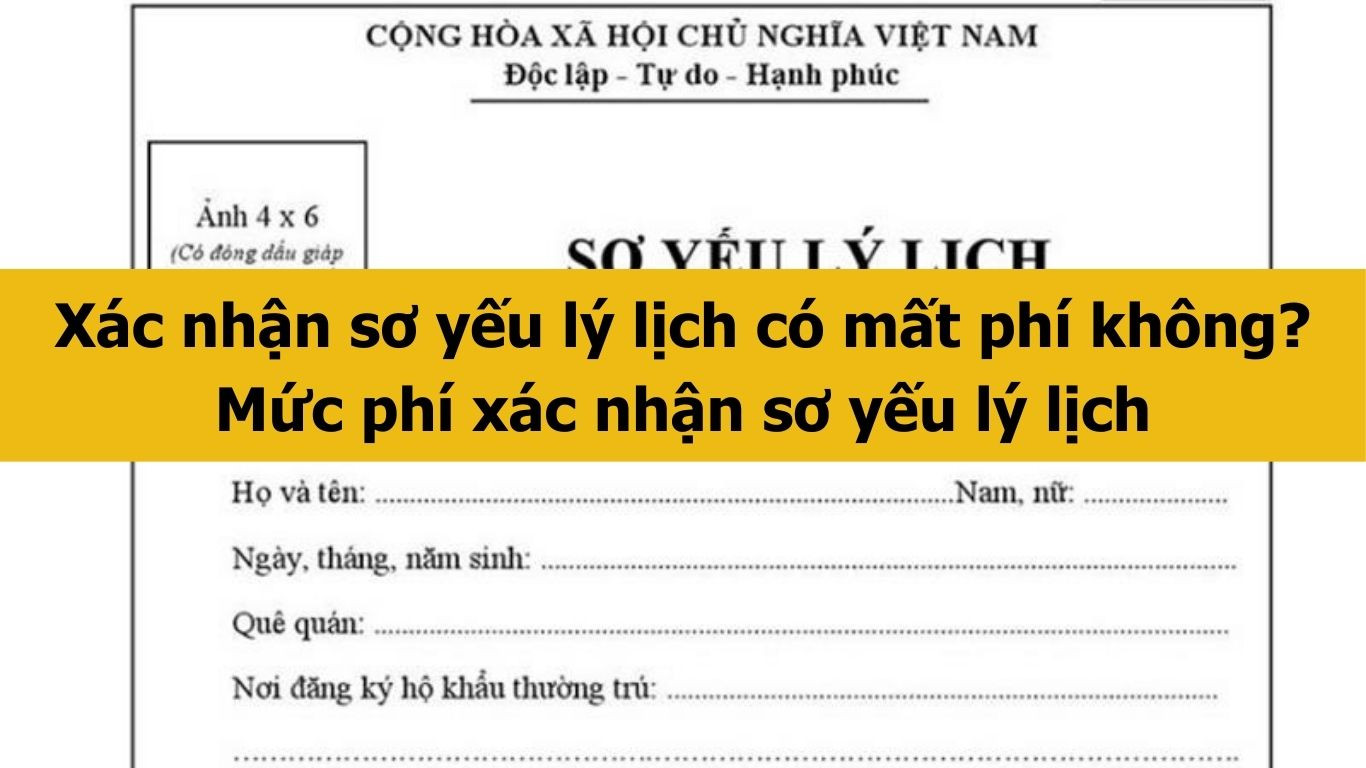
Xác nhận sơ yếu lý lịch có mất phí không? Mức phí xác nhận sơ yếu lý lịch mới nhất 2025
Sơ yếu lý lịch là loại giấy tờ quan trọng trong rất nhiều hoạt động như xin việc làm, nhập học…Nhiều người vẫn còn thắc mắc xác nhận sơ yếu lý lịch có mất phí không? Mức phí xác nhận sơ yếu lý lịch mới nhất năm 2025 là bao nhiêu? Bài viết này chúng tôi sẽ trả lời cho các câu hỏi đó. 07/01/2025Xác nhận sơ yếu lý lịch ở nơi tạm trú có được không?
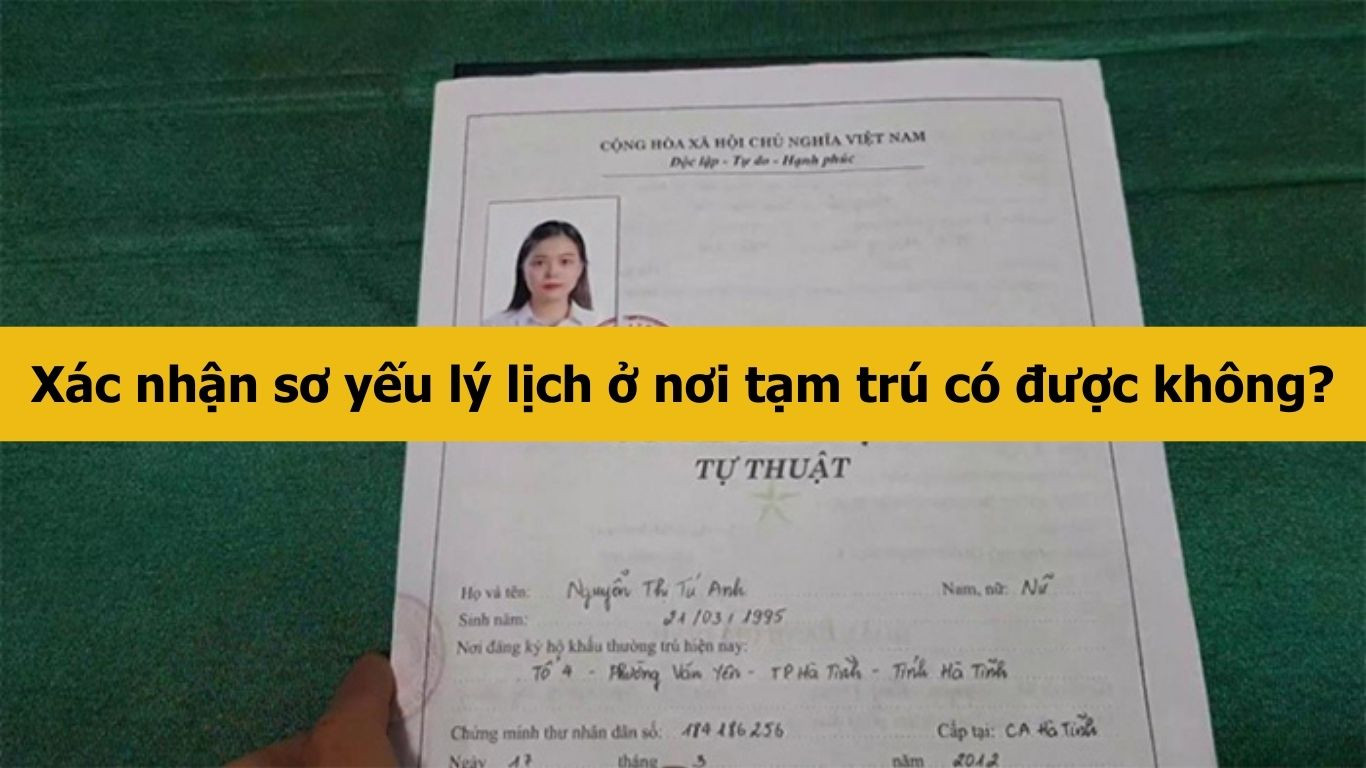
Xác nhận sơ yếu lý lịch ở nơi tạm trú có được không?
Sơ yếu lý lịch là loại giấy tờ quan trọng trong rất nhiều hoạt động như xin việc làm, nhập học…Nhiều người vẫn còn thắc mắc xác nhận sơ yếu lý lịch ở nơi tạm trú có được không? Bài viết này chúng tôi sẽ trả lời cho câu hỏi đó. 07/01/202503 mẫu sơ yếu lý lịch tự thuật mới nhất 2025 và cách ghi chi tiết

03 mẫu sơ yếu lý lịch tự thuật mới nhất 2025 và cách ghi chi tiết
Sơ yếu lý lịch tự thuật là một tài liệu quan trọng trong nhiều thủ tục hành chính, từ xin việc làm, nhập học đến các quy trình tuyển dụng trong cơ quan nhà nước. Để hỗ trợ bạn đọc dễ dàng lựa chọn và điền đúng thông tin, bài viết này sẽ giới thiệu 03 mẫu sơ yếu lý lịch tự thuật mới nhất năm 2025 kèm theo hướng dẫn chi tiết cách ghi. Những mẫu này được thiết kế đáp ứng các tiêu chuẩn mới, phù hợp với yêu cầu hiện hành và giúp bạn hoàn thiện hồ sơ nhanh chóng, chính xác. 06/01/2025Xác nhận sơ yếu lý lịch khác tỉnh được không?
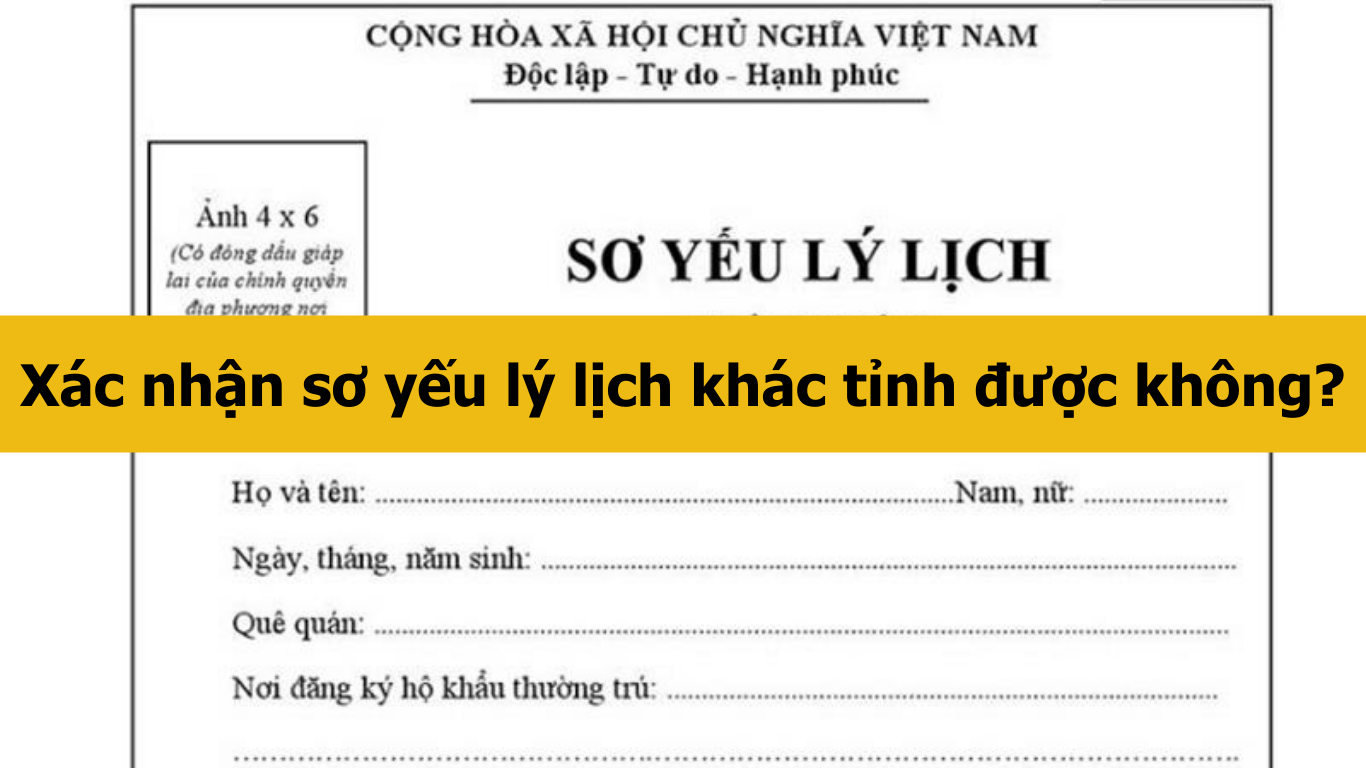
Xác nhận sơ yếu lý lịch khác tỉnh được không?
Sơ yếu lý lịch là loại giấy tờ quan trọng trong rất nhiều hoạt động như xin việc làm, nhập học…Nhiều người vẫn còn thắc mắc xác nhận sơ yếu lý lịch khác tỉnh được không? Bài viết này chúng tôi sẽ trả lời cho câu hỏi đó. 08/01/2025Xác nhận sơ yếu lý lịch ở đâu? Xác nhận sơ yếu lý lịch có cần về quê không?
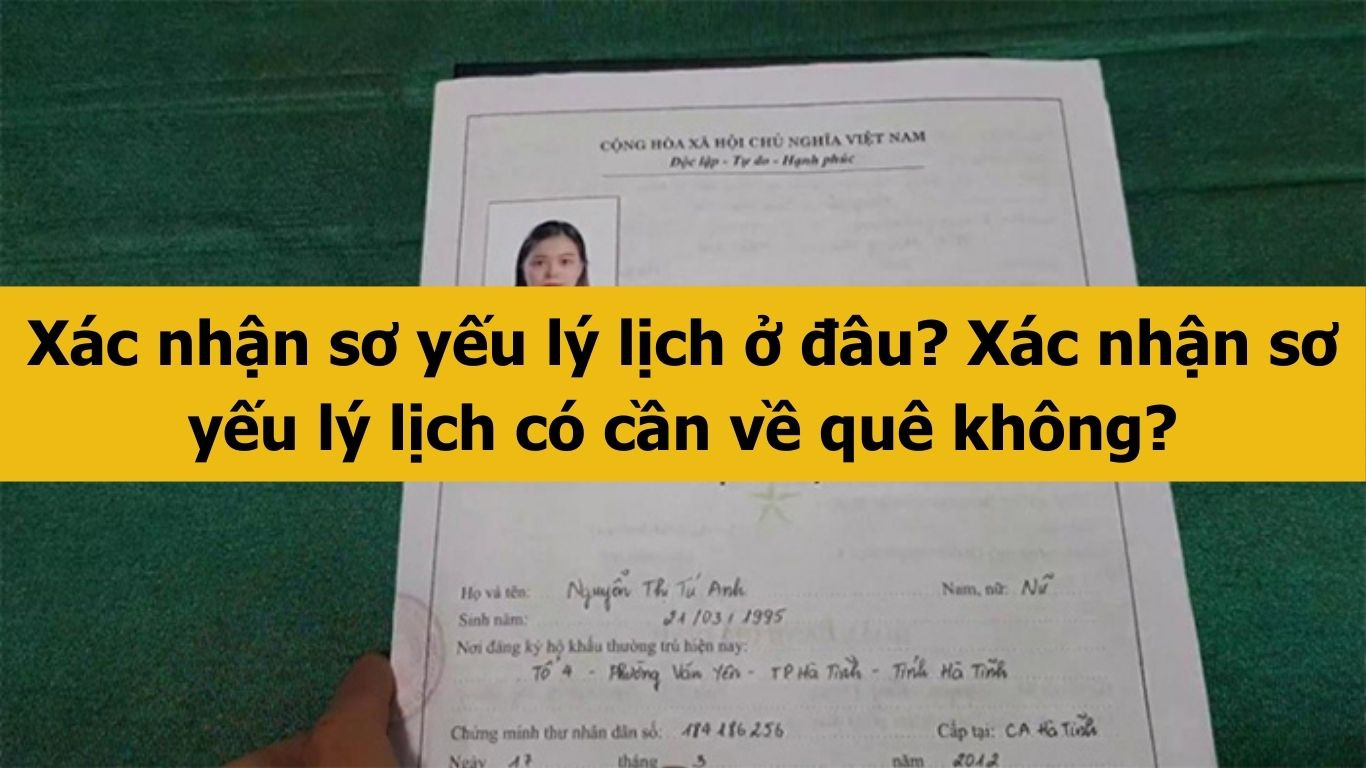
Xác nhận sơ yếu lý lịch ở đâu? Xác nhận sơ yếu lý lịch có cần về quê không?
Sơ yếu lý lịch là loại giấy tờ quan trọng trong rất nhiều hoạt động như xin việc làm, nhập học…Nhiều người vẫn còn thắc mắc xác nhận sơ yếu lý lịch ở đâu? Xác nhận sơ yếu lý lịch có cần về quê không? Qua bài viết này, chúng tôi sẽ trả lời cho các câu hỏi trên. 08/01/2025Xác nhận sơ yếu lý lịch cần giấy tờ gì? Có cần sổ hộ khẩu không?
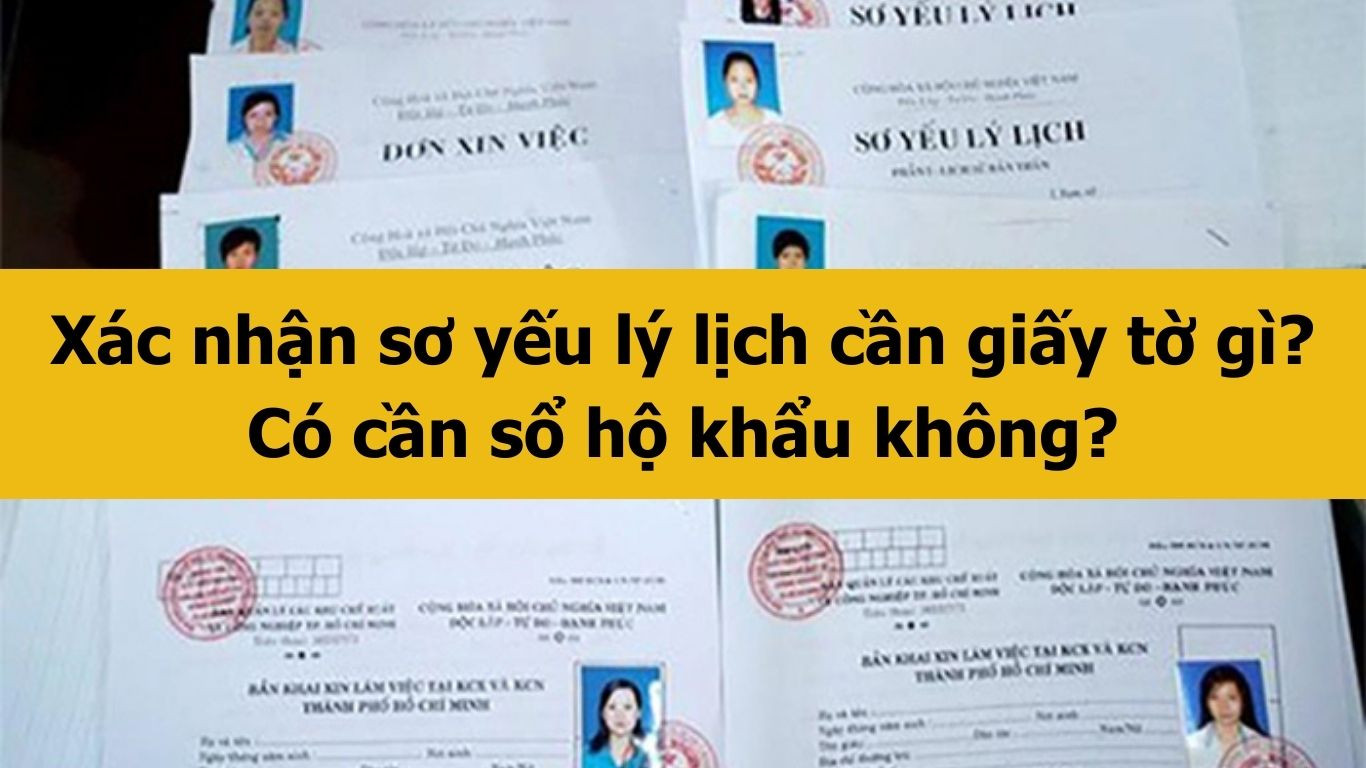
Xác nhận sơ yếu lý lịch cần giấy tờ gì? Có cần sổ hộ khẩu không?
Sơ yếu lý lịch là loại giấy tờ quan trọng trong rất nhiều hoạt động như xin việc làm, nhập học…Nhiều người vẫn còn thắc mắc xác nhận sơ yếu lý lịch cần giấy tờ gì? Có cần sổ hộ khẩu không? Chúng tôi qua bài viết này sẽ giúp trả lời cho những câu hỏi đó. 08/01/202503 mẫu sơ yếu lý lịch xin việc mới nhất 2025 và cách ghi chi tiết
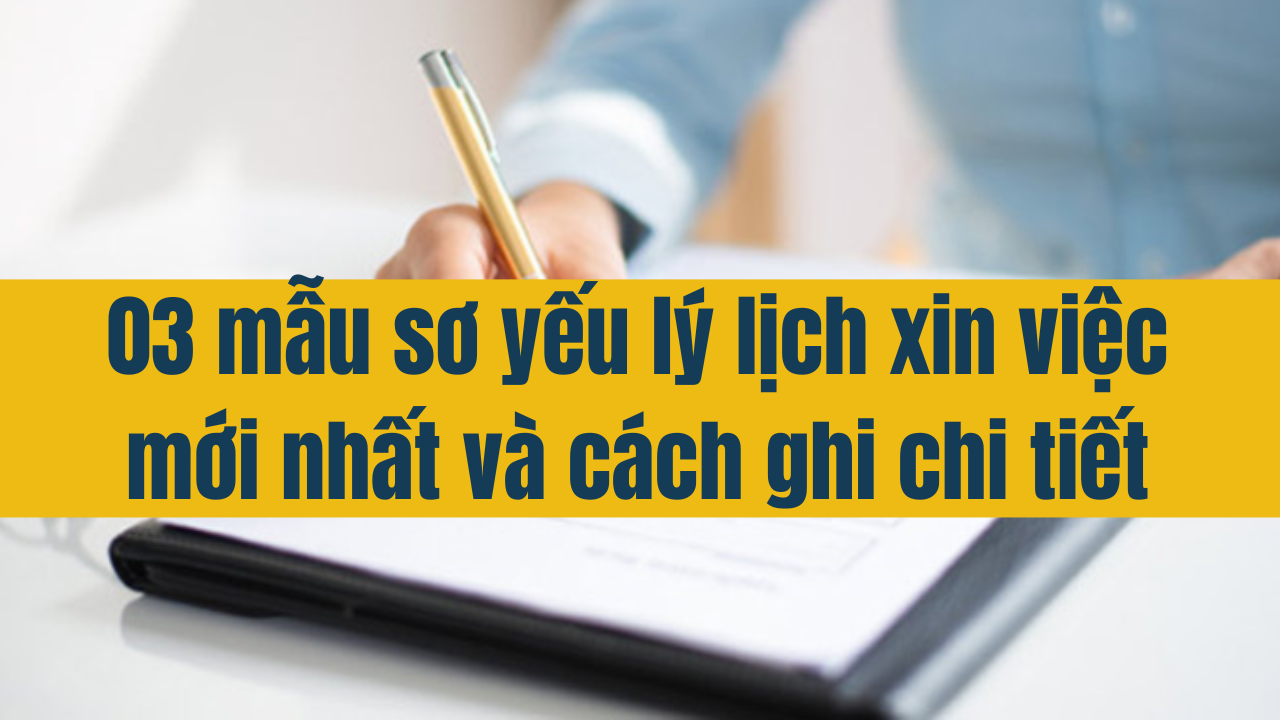
03 mẫu sơ yếu lý lịch xin việc mới nhất 2025 và cách ghi chi tiết
Mẫu sơ yếu lý lịch không chỉ giúp nhà tuyển dụng có cái nhìn tổng quan về ứng viên mà còn phản ánh sự chuyên nghiệp của họ. Để đáp ứng nhu cầu thay đổi và yêu cầu ngày càng cao trong tuyển dụng, các mẫu sơ yếu lý lịch xin việc mới nhất 2025 đã có nhiều cập nhật về nội dung và hình thức. Trong bài viết này, chúng ta sẽ cùng tìm hiểu về 03 mẫu sơ yếu lý lịch xin việc mới nhất 2025 và cách ghi chi tiết để giúp ứng viên tạo ấn tượng mạnh với nhà tuyển dụng. 30/12/2024Mẫu Sơ yếu lý lịch có xác nhận của địa phương mới nhất 2025
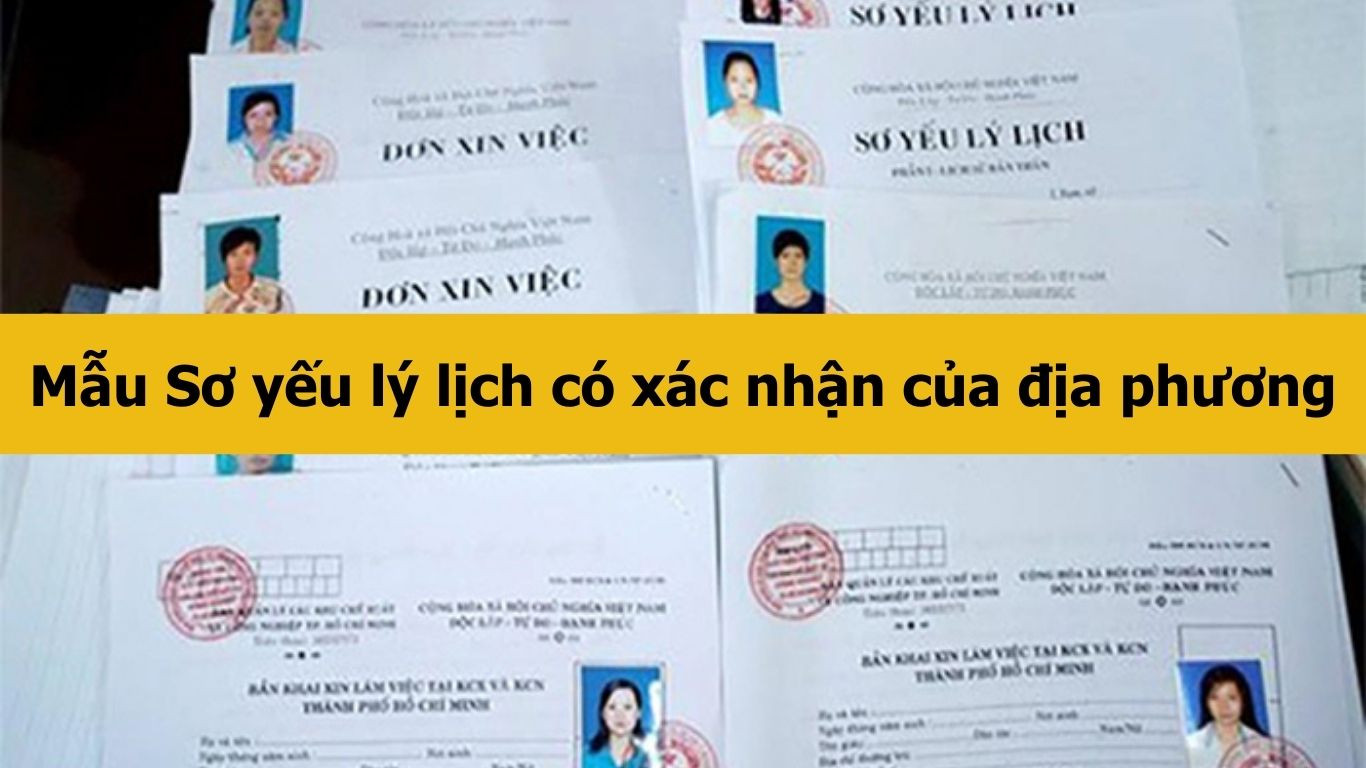
Mẫu Sơ yếu lý lịch có xác nhận của địa phương mới nhất 2025
Sơ yếu lý lịch có xác nhận của địa phương được sử dụng trong rất nhiều hoạt động như xin việc làm, nhập học…Sơ yếu lý lịch là loại giấy tờ quan trọng trong các hoạt động ấy. Trong bài viết này, chúng tôi sẽ cung cấp mẫu Sơ yếu lý lịch có xác nhận của địa phương mới nhất 2025 và một số vấn đề liên quan đến sơ yếu lý lịch. 04/01/2025Sơ yếu lý lịch có được đánh máy không? Mẫu sơ yếu lý lịch đánh máy chuẩn mới nhất

Sơ yếu lý lịch có được đánh máy không? Mẫu sơ yếu lý lịch đánh máy chuẩn mới nhất
Sơ yếu lý lịch là một trong những loại giấy tờ quan trọng và cần thiết khi làm hồ sơ xin việc hay học tập. Thông qua sơ yếu lý lịch, nhà tuyển dụng sẽ biết được những thông tin cơ bản về ứng viên. Một sơ yếu lý lịch được xem là hợp pháp khi được công chứng đầy đủ. Vậy, sơ yếu lý lịch có được đánh máy không? Mẫu sơ yếu lý lịch đánh máy chuẩn mới nhất. Khám phá câu trả lời chi tiết qua bài viết này. 08/01/2025Sơ yếu lý lịch có cần công chứng không? Công chứng sơ yếu lý lịch ở đâu?
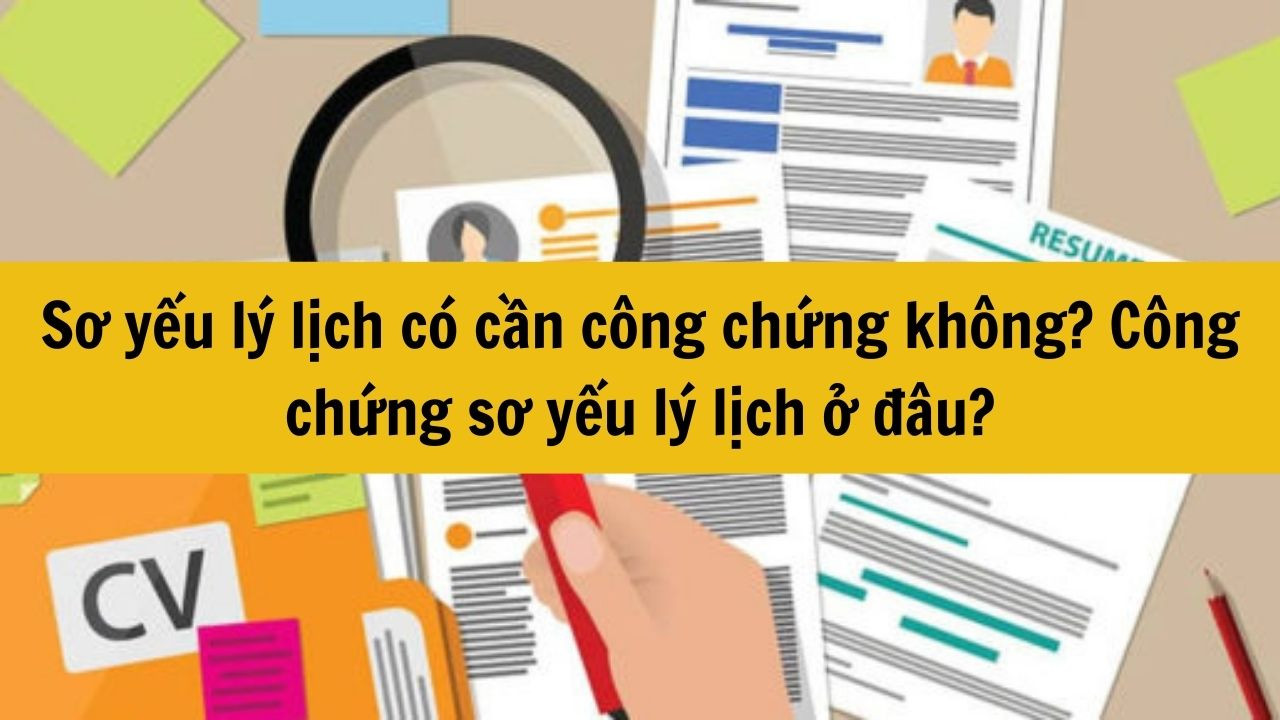

 Nghị định 23/2015/NĐ-CP (Bản Word)
Nghị định 23/2015/NĐ-CP (Bản Word)
 Nghị định 23/2015/NĐ-CP (Bản Pdf)
Nghị định 23/2015/NĐ-CP (Bản Pdf)